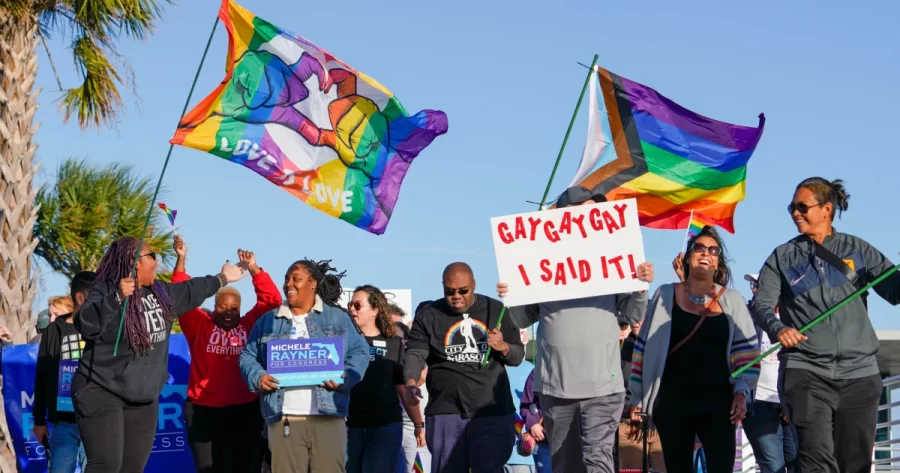Florida adopts new potentially harmful legislation for the LGBTQ+ community
An increasing number of protesters gather after Florida passes the “Don’t Say Gay” Bill
On March 28th, Florida Governor Ron DeSantis signed the “Parental Rights in Education” bill, which has quickly become more widely known as the “Don’t Say Gay” bill. This law now bans all public school teachers in Florida from providing instruction on sexuality and gender identity in kindergarten through the third grade.
It was only in recent years that public schools began to integrate more LGBTQ+ education, but it is not typically a part of curriculums. Instead, some teachers, mainly in middle and high school, choose to have mature conversations with their students regarding sexual orientation.
According to NPR, DeSantis believes in this piece of legislation because it “will make sure that parents can send their kids to school to get an education, not an indoctrination.” DeSantis believes that kindergarten through third-grade students are not old enough or developmentally ready to learn about such “taboo” topics. Essentially, DeSantis is using this legislation to demonstrate his homophobic beliefs because learning about sexuality and gender orientation is “not something that’s appropriate for any place, but especially not in Florida.”
Many parents supporting the bill believe that it is their right to introduce such topics when they choose. But for those who have an issue with young children learning about the LGBTQ+ community, let me ask you this. Why is it okay to teach young boys that they should like girls? Is that not promoting a certain sexuality? This is only what is taught because it is what is widely accepted in society. But does that make it right?
According to Johns Hopkins Medicine, “sexual development begins in a child’s very first years,” and it is at this time when “kids develop an emotional and physical foundation for sexuality.” Having their feelings repressed and not having access to a welcoming environment can be extremely detrimental to anyone who is questioning their gender or sexuality. Especially for little kids, there is a difference established by society between boys and girls. However, 26% of LGBTQ+ youths identify as non-binary, according to the Trevor Project. This potentially leaves many children struggling to find their place in school.
Many children even may have parents or other family members who identify within the LGBTQ+ community. This new bill also restricts how much teachers are able to talk to their own students. This puts teachers in a difficult place. The goal of most teachers, especially in elementary schools, is to reach their students on a more personal level. This bill may prevent teachers from speaking to struggling students, many of whom are already more prone to bullying and suicidal thoughts. The bill also includes that parents have to be notified if students are offered support services, which could potentially out kids as LGBTQ+ before they are ready to talk to their parents.
The bill has not come without immense controversy from the public. Many LGBTQ+ advocates, students’ parents and other organizations have begun to push back, with some even taking legal action. One such group of advocates has filed a lawsuit against the bill saying that it is potentially harmful and silences students in Florida’s public schools. However, DeSantis remains firm in his pro-legislation stance and vehemently believes that nothing will come of the lawsuit.
The most important takeaway from this legislation is that the LGBTQ+ community remains so stigmatized in today’s society. Although many believe that the United States as a whole has become more accepting and welcoming, homophobic undertones remain prevalent. It is important that sexuality and gender identity continue to be talked about, despite how uncomfortable it might make you, in order to take another step forward in destigmatization.


